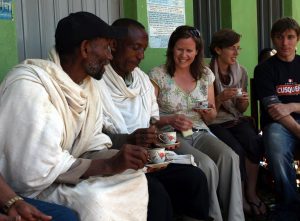Founded in Christchurch in 1973, Trade Aid works with small food and craft producers around the world.
Its vision is to help Kiwis support a world where trade is fair for all.
Coffee entered the Trade Aid picture in 1985 when the social enterprise began importing coffee for sale in Trade Aid stores and other retailers nationwide.
Michelia Miles, Trade Aid Development and Education Manager, says purchasing fair trade coffee provides critical income support to small-scale coffee farmers.
“We currently provide farmers with more than $3 million per year in extra income above market prices. This helps them meet the nutritional, health, educational and other basic needs of their families.”
Trade Aid coffee is purchased directly from co-operatives in ten countries – Ethiopia, Democratic Republic of the Congo, Tanzania, Colombia, Brazil, Peru, Guatemala, Nicaragua, Mexico and Honduras. After six to eight weeks in transit, it all percolates into Lyttelton Port.

Volumes are impressive, with seventy 20ft containers (over 1,300 tonnes of coffee) expected in 2021.
After being unloaded, the coffee is trucked to Trade Aid’s Dallington warehouse for MPI clearance before being dispatched around the country.
Trade Aid Logistics Coordinator Ian Collis says LPC’s website and tracking tools help him keep tabs on the coffee as it reaches New Zealand shores.
“As our containers move closer to Lyttelton, we switch from track and trace functions on shipping websites to using the LPC site itself. The LPC shipping schedule tells us when vessels are due to arrive, and we can use container tracking to find out when each container is discharged.”
To keep up with Kiwi demand for short blacks and flat whites, Trade Aid’s imports continue to grow each year.
In addition to Trade Aid branded coffee, it also imports green beans for more than 80 coffee roasters nationwide.
Another thing to feel good about over your next cup of Trade Aid coffee is knowing that it’s all certified organic.
“Because our coffee is certified organic, customers can be confident that they’re supporting good environmental stewardship,” says Michelia.
“It’s exciting to be able to support fairer incomes and good farming practices for a growing number of coffee producers each year.”
That’s a lot to feel good about with every sip.